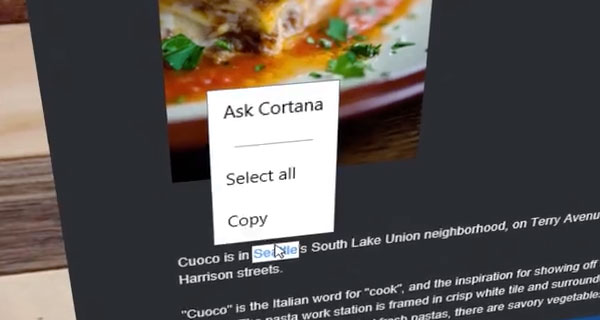Microsoft on Wednesday made its new Edge browser, developed under the code name “Project Spartan,” available to participants in the Windows Insider Program. Joe Belfiore, corporate vice president, operating systems group, made the announcement at the company’s Build developers’ conference, being held in San Francisco through Friday.
Edge is available through the Windows 10 Preview, accessible to Windows Insiders.
“If you are comfortable running unfinished software on, preferably, a secondary device, you can join the Windows Insider Program and explore the Windows 10 Technical Preview,” spokesperson Sophia Brockman told TechNewsWorld.
Edge Features in the Preview
Edge incorporates Cortana, Microsoft’s personal assistant. That lets it “learn what you care about and helps you get things done,” Belfiore said.
Cortana’s incorporation let Microsoft revamp the Tabs page, so when users open a new tab page in Windows 10 using Edge, the browser basically will serve up a personalized page.
For devs, Edge is “blazing fast core technology that’s inside,” Belfiore said. It lets devs write apps as universal Windows apps, and “we’re going to make it help users discover and engage with fewer apps.”
Edge has built-in Web extensions that let users engage with devs’ sites, he revealed. Those extensions use Web standards and include a feature that lets people use the Reddit enhancements suite.
It was “virtually no work” to take the Reddit extension from the Chrome extension store and run it in Edge, Belfiore said.
There’s also a Pinterest extension.
“Clearly, Edge is not finalized, but from what I’ve seen there are some really powerful features,” said Al Hilwa, a research program director at IDC.
Gobsmacking Google Chrome
Why go to the trouble of creating a new browser from scratch instead of spiffing up the venerable IE?
Edge is designed to be a Chrome killer, said Rob Enderle, principal at the Enderle Group.
“I’ve been using Edge for some time, and one of the interesting things is that for websites that identify the browser and [tailor] what they present based on the browser they see, many see Edge as Chrome,” he told TechNewsWorld.
“We are seeing the ’embrace’ and a little of the ‘extend’ steps of the traditionally successful Microsoft “embrace, extend, et cetera” strategy,” Enderle added.
“The strategy of turning a new page with a new browser will probably be effective in the long run, as Microsoft may well bring this browser to other platforms,” Hilwa told TechNewsWorld.
“Browsers have to walk a fine line of supporting standards,” he noted, “and be compatible with other browsers and add value to the platform or device they are on.”
The list of available browsers is long, and Edge may help consolidate users’ browsing experience.
However, skeptics may expect it to lead to the filing of antitrust complaints and lawsuits.
Past and Future
Edge is going to be the linchpin for Windows 10, and given that it will take both consumer and business users some years to move to a new version of an OS — many companies are still running Windows XP on their PCs — the question of backward compatibility has to be raised.
That’s not going to be a problem, Enderle said.
Microsoft has two browsers in Windows 10 — IE 11 and Edge. IE 11 works with older pages written specifically for IE, while Edge “looks forwards at Web properties that largely currently break on IE but work fine with Google Chrome,” he pointed out.
Further, one little-known feature of Windows 10 is that if users are in IE and open a page that works better with Edge, the page should seamlessly open with Edge instead, and vice versa, Enderle noted.
Microsoft’s goal for Edge “is to step around the legacy problems with IE, which have been killing that browser,” he said. “That’s all it really needs to do at this point, and it does that.”
























































After decades of incompetence and arrogance that resulted in a slower browsing experience, security problems and major headaches for developers, it appears that Microsoft has finally learned it’s lesson. Internet Exploder is already the fastest browser I use, in part because it preloads with Windows, giving it an *unfair* advantage, and in part because it is just, well, fast.
But it still doesn’t run the plugins that I want to use with it; at least not well. Perhaps Edge will change that. But the question remains, will the Microsoft name and it’s association with IE remain a ball and chain around the ankle, both from a developer and user perspective, of what may be a pretty terrific browser? I guess time will tell.